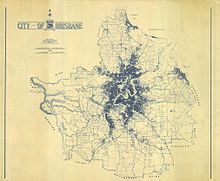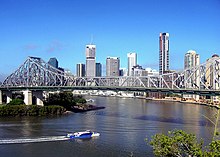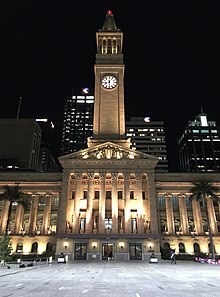Greater Brisbane (1925)
The LGAs in the other mainland state capitals (Sydney, Melbourne, Perth and Adelaide) are generally responsible only for the central business districts and inner neighbourhoods of those cities. However, the City of Brisbane administers a significant portion of the Brisbane Greater Capital City Statistical Area (GCCSA), accounting for just under half its population. As such, it has a larger population than any other local government area in Australia. The City of Brisbane was the first Australian LGA to reach a population of more than one million. Its population is roughly equivalent to the populations of Tasmania, the Australian Capital Territory and the Northern Territory combined. In 2016–2017, the council administered a budget of over $3 billion, by far the largest budget compared to those of the City of Sydney and City of Melbourne LGAs.
The City derives from cities, towns and shires that merged in 1925. The main offices and central library of the council are at 266 George Street, also known as Brisbane Square. Brisbane City Hall houses the Council Chamber, the offices of the Lord Mayor and Deputy Mayor, meeting and reception rooms and the Museum of Brisbane.
In the 2021 census, the City of Brisbane had a population of 1,242,825 people.
Suburbs
The City of Brisbane includes the following settlements:
Inner suburbs
Total: 19
Northern suburbs
- Albion
- Alderley
- Ascot
- Aspley
- Bald Hills
- Banyo
- Boondall
- Bracken Ridge
- Bridgeman Downs
- Brighton
- Brisbane Airport
- Carseldine
- Chermside
- Chermside West
- Clayfield
- Deagon
- Eagle Farm
- Everton Park
- Ferny Grove
- Fitzgibbon
- Gaythorne
- Geebung
- Gordon Park
- Grange
- Hamilton
- Hendra
- Kalinga
- Kedron
- Keperra
- Lutwyche
- McDowall
- Mitchelton
- Myrtletown
- Newmarket
- Northgate
- Nudgee
- Nudgee Beach
- Nundah
- Pinkenba
- Sandgate
- Shorncliffe
- Stafford
- Stafford Heights
- Taigum
- Virginia
- Wavell Heights
- Wilston
- Windsor
- Wooloowin
- Zillmere
Total: 50
Southern suburbs
- Acacia Ridge
- Algester
- Annerley
- Archerfield
- Burbank
- Calamvale
- Coopers Plains
- Darra
- Doolandella
- Drewvale
- Durack
- Dutton Park
- Eight Mile Plains
- Ellen Grove
- Fairfield
- Forest Lake
- Greenslopes
- Heathwood
- Holland Park
- Holland Park West
- Inala
- Karawatha
- Kuraby
- Larapinta
- MacGregor
- Mackenzie
- Mansfield
- Moorooka
- Mount Gravatt
- Mount Gravatt East
- Nathan
- Pallara
- Parkinson
- Richlands
- Robertson
- Rochedale
- Rocklea
- Runcorn
- Salisbury
- Seventeen Mile Rocks
- Sinnamon Park
- Stones Corner
- Stretton
- Sumner
- Sunnybank
- Sunnybank Hills
- Tarragindi
- Tennyson
- Upper Mount Gravatt
- Wacol
- Willawong
- Wishart
- Yeerongpilly
- Yeronga
Total: 54
Eastern suburbs
Total: 27
Western suburbs
- Anstead
- Ashgrove
- Auchenflower
- Banks Creek
- Bellbowrie
- Brookfield
- Chapel Hill
- Chelmer
- Chuwar
- Corinda
- England Creek
- Enoggera
- Enoggera Reservoir
- Ferny Grove
- Fig Tree Pocket
- Graceville
- Indooroopilly
- Jamboree Heights
- Jindalee
- Karana Downs
- Kenmore
- Kenmore Hills
- Kholo
- Lake Manchester
- Middle Park
- Milton
- Moggill
- Mount Coot-tha
- Mount Crosby
- Mount Ommaney
- Oxley
- Pinjarra Hills
- Pullenvale
- Riverhills
- Sherwood
- Sinnamon Park
- St Lucia
- Taringa
- The Gap
- Toowong
- Upper Brookfield
- Upper Kedron
- Westlake
Total: 43
Moreton Bay
Total: 5
History




The Government of Queensland created the City of Brisbane with a view to uniting the Brisbane metropolitan area under a single planning and governance structure. The City of Brisbane Act 1924 received assent from the Governor on 30 October 1924. On 1 October 1925, twenty local government areas of various sizes were abolished and merged into the new city, namely:
- Cities:
- Towns:
- Shires:
The council also assumed responsibility for several quasi-autonomous government authorities, such as the Brisbane Tramways Trust.
Demographics
| Selected historical census data for City of Brisbane local government area | |||||||
|---|---|---|---|---|---|---|---|
| Census year | 2001 | 2006 | 2011 | 2016 | 2021 | ||
| Population | Estimated residents on census night | 873,780 | 956,129 | 1,041,839 | 1,131,155 | 1,242,825 | |
| LGA rank in terms of size within Queensland | 1st | ||||||
| % of Queensland population | 24.37% | ||||||
| % of Australian population | 4.66% | ||||||
| Cultural and language diversity | |||||||
| Ancestry, top responses |
English | 25.0% | |||||
| Australian | 23.1% | ||||||
| Irish | 9.5% | ||||||
| Scottish | 7.4% | ||||||
| Chinese | 4.1% | ||||||
| Language, top responses (other than English) |
Mandarin | 1.4% | |||||
| Cantonese | 1.4% | ||||||
| Vietnamese | 1.3% | ||||||
| Italian | 1.1% | ||||||
| Greek | 0.8% | ||||||
| Spanish | 0.7% | ||||||
| Korean | 1.0% | ||||||
| Religious affiliation | |||||||
| Religious affiliation, top responses |
Catholic | 28.0% | |||||
| Anglican | 19.5% | ||||||
| No religion | 15.0% | ||||||
| Uniting | 7.8% | ||||||
| Presbyterian | 3.7% | ||||||
| Buddhism | 3.0% | ||||||
| Median weekly incomes | |||||||
| Personal income | Median weekly personal income | A$556 | A$696 | A$770 | |||
| % of Australian median income | 119.3% | 120.6% | 116.3% | ||||
| Family income | Median weekly family income | A$1403 | A$1873 | A$2091 | |||
| % of Australian median income | 119.8% | 126.5% | 120.6% | ||||
| Household income | Median weekly household income | A$1157 | A$1547 | A$1746 | |||
| % of Australian median income | 112.7% | 125.4% | 121.4% | ||||
| Dwelling structure | |||||||
| Dwelling type | Separate house | 74.7% | |||||
| Semi-detached, terrace or townhouse | 6.7% | 7.9% |
|||||
| Flat or apartment | 17.2% | ||||||
Heritage
The Brisbane City Council maintains the Brisbane Local Heritage Register, a list of nominated sites that satisfy the council's heritage criteria.
Governance
The City of Brisbane is governed by the Brisbane City Council, the largest local council in Australia. The Brisbane City Council has its power divided between a lord mayor, a parliamentary-style council of twenty-six councillors representing single-member wards of approximately 30,000 voters (roughly equivalent in size to state electorates), and a civic cabinet comprising the lord mayor, the deputy mayor (drawn from the majority on council) and the chairpersons of the seven standing committees drawn from the membership of council. Due to the City of Brisbane's status as the country's largest LGA, the lord mayor is elected by the largest single-member electorate in Australia. Like all mayors in Queensland, the lord mayor is vested with very broad executive power.
The Brisbane City Council operates under the City of Brisbane Act 2010, while other local governments in Queensland are governed by the Local Government Act 2009. Council meetings are held at Level 2, City Hall, 64 Adelaide Street, Brisbane City every Tuesday at 2pm except during recess and holiday periods. This temporary venue is in use due to the restoration work being performed on the traditional venue Brisbane City Hall. Council Meetings generally open to the public, excluding the Civic Cabinet.
Wards
Brisbane City Council | |
|---|---|
| 31st Council | |
 | |
 Logo | |
| Type | |
| Type | |
| History | |
| Founded | 1924 |
| Preceded by | City of Brisbane City of South Brisbane |
| Leadership | |
Deputy Mayor | Krista Adams, Liberal National |
Leader of the Opposition | Jared Cassidy, Labor |
Chair of Council | Steven Toomey, Liberal National |
Deputy Chair of Council | Sandy Landers, Liberal National |
| Structure | |
| Seats | 27 elected representatives including Lord Mayor and 26 Ward Councillors |
 | |
Political groups |
|
| Committees | 10 |
Length of term | 4 years |
| Salary | A$164,156 (2021) |
| Elections | |
| Instant-runoff voting | |
First election | 21 February 1925 |
Last election | 28 March 2024 |
Next election | March 2028 |
| Motto | |
| Meliora Sequimur | |
| Meeting place | |
 | |
| Brisbane City Hall, King George Square, Brisbane | |
| Website | |
| www | |
The city of Brisbane is divided by 26 wards, each of which is represented by a councillor. Elections for these positions are held every four years. The results of the March 2024 elections delivered a Liberal National Party majority, with the wards of the City of Brisbane represented by the following councillors:
| Party | Wards | Current Chamber (Total 26 Wards) | |
|---|---|---|---|
| Liberal National | 19 | ||
| Labor | 5 | ||
| Greens | 2 | ||
| Independent | 1 | ||
| Ward | Party | Councillor | |
|---|---|---|---|
| Bracken Ridge | LNP | Sandy Landers | |
| Calamvale | Labor | Emily Kim | |
| Central | LNP | Vicki Howard | |
| Chandler | LNP | Ryan Murphy | |
| Coorparoo | LNP | Fiona Cunningham | |
| Deagon | Labor | Jared Cassidy | |
| Doboy | LNP | Lisa Atwood | |
| Enoggera | LNP | Andrew Wines | |
| Forest Lake | Labor | Charles Strunk | |
| Hamilton | LNP | Julia Dixon | |
| Holland Park | LNP | Krista Adams | |
| Jamboree | LNP | Sarah Hutton | |
| MacGregor | LNP | Steven Huang | |
| Marchant | LNP | Fiona Hammond | |
| McDowall | LNP | Tracy Davis | |
| Moorooka | Labor | Steve Griffiths | |
| Morningside | Labor | Lucy Collier | |
| Northgate | LNP | Adam Allan | |
| Paddington | Greens | Seal Chong Wah | |
| Pullenvale | LNP | Greg Adermann | |
| Runcorn | LNP | Kim Marx | |
| Tennyson | Independent | Nicole Johnston | |
| The Gabba | Greens | Trina Massey | |
| The Gap | LNP | Steven Toomey | |
| Walter Taylor | LNP | Penny Wolff | |
| Wynnum Manly | LNP | Alex Givney | |
Heraldry

The motto of the City of Brisbane is Meliora sequimur, Latin for We aim for better things. The council's corporate slogan is Dedicated to a better Brisbane. The city's colours are blue and gold. Its corporate logo was introduced in 1982 in preparation for the Commonwealth Games hosted in Brisbane that year. It features a stylised version of Brisbane's City Hall which opened in 1930. The city's floral emblems are the (exotic) poinsettia and Brisbane wattle, and its faunal emblems are the graceful tree frog and the koala.
Amenities
Brisbane City Council operate libraries in Annerley, Ashgrove, Banyo, Bracken Ridge, Brisbane CBD (Brisbane Square), Bulimba, Carina, Carindale (Westfield Carindale), Chermside, Coopers Plains, Corinda, Everton Park, Fairfield, Upper Mount Gravatt (Garden City), Grange, Hamilton, Holland Park, Inala, Indooroopilly, Kenmore, Mitchelton, Mount Coot-tha (Botanic Gardens), Mount Gravatt, Mount Ommaney, New Farm, Nundah, Sandgate, Stones Corner, Sunnybank Hills, Toowong, West End, Wynnum, and Zillmere. In addition, it operates a mobile library service to Aspley, Bellbowrie, Brighton, Ellen Grove, Forest Lake, Manly West, Mount Crosby and The Gap. There is also a pop-up library that attends community events and festivals, as well as visiting various parks around Brisbane for children's storytime sessions (a list of dates and places is published some months in advance).
Sister cities
Brisbane's sister cities are:
Nice, France was formerly a sister city of Brisbane until the relationship was severed in 1995 as protest against the Chirac government's decision to resume nuclear testing in the Pacific Ocean. Bangkok became a sister city of Brisbane in 1997, but the partnership ended in 2017 at the latest.
See also
Notes
References
- ^ Australian Bureau of Statistics (28 June 2022). "Brisbane (C)". 2021 Census QuickStats. Retrieved 24 October 2022.
- ^ "3218.0 – Regional Population Growth, Australia, 2017-18: Population Estimates by Local Government Area (ASGS 2018), 2017 to 2018". Australian Bureau of Statistics. Australian Bureau of Statistics. 27 March 2019. Archived from the original on 27 March 2019. Retrieved 25 October 2019. Estimated resident population, 30 June 2018.
- ^ "Table 1: Population growth and turnover in Local Government Areas (LGAs), 2006 to 2011". Australian Bureau of Statistics. 25 November 2009. Retrieved 10 August 2015.
- ^ Hiroaki Suzuki; Arish Dastur; Sebastian Moffatt; Nanae Yabuki; Hinako Maruyama (2010). Eco2 Cities: Ecological Cities as Economic Cities. World Bank. p. 213. ISBN 978-0-8213-8046-8. Archived from the original on 17 December 2010. Retrieved 12 March 2011.
- ^ "Council Annual Plan and Budget 2016–17". Brisbane City Council. 2 June 2017. Archived from the original on 19 June 2017. Retrieved 19 June 2017.
- ^ "City of Sydney Annual Report General Purpose Financial Statements 2016/17" (PDF). City of Sydney. pp. 4–5. Retrieved 4 May 2024.
- ^ "Annual Plan and Budget 2016-2017" (PDF). City of Melbourne. pp. 18–20. Retrieved 4 May 2024.
- ^ City of Brisbane Act 1924 Archived 13 March 2011 at the Wayback Machine (accessed 23 January 2011)
- ^ Australian Bureau of Statistics (9 March 2006). "City of Brisbane (C)". 2001 Census QuickStats. Retrieved 3 December 2017.
- ^ Australian Bureau of Statistics (25 October 2007). "City of Brisbane (C)". 2006 Census QuickStats. Retrieved 3 December 2017.
- ^ Australian Bureau of Statistics (31 October 2012). "City of Brisbane (C)". 2011 Census QuickStats. Retrieved 3 December 2017.
- ^ Australian Bureau of Statistics (27 June 2017). "Brisbane (C)". 2016 Census QuickStats. Retrieved 28 August 2020.
- ^ "QUEENSLAND HERITAGE ACT 1992 – SECT 113". Queensland Consolidated Acts. Queensland Government. Archived from the original on 22 February 2014. Retrieved 14 September 2012.
- ^ "Summary of Current Enrolment per Ward (Enrolment figures as at 31 January 2019)" (PDF). Brisbane City Council. Archived from the original (PDF) on 15 May 2019. Retrieved 15 May 2019.
- ^ "Meeting dates & locations". Brisbane City Council. Archived from the original on 8 August 2014. Retrieved 21 March 2010.
- ^ "City Hall Restoration". Brisbane City Council. Archived from the original on 7 August 2014. Retrieved 21 March 2010.
- ^ Stone, Lucy (31 May 2022). "Brisbane councillors to receive second pay rise in nine months after 2.5 per cent increase recommended". ABC News. Archived from the original on 1 February 2023. Retrieved 12 February 2023.
- ^ "Super Saturday". The Courier Mail. 4 February 2024.
- ^ "Voters head to the polls in Australia's biggest council election race that Antony Green describes as 'significant'". ABC News. 6 March 2024. Retrieved 17 June 2024.
- ^ Queensland, Electoral Commission of (20 March 2024). "Election events". www.ecq.qld.gov.au. Retrieved 17 June 2024.
- ^ "2024 Local Government Elections: Brisbane City". Electoral Commission of Queensland. Retrieved 16 June 2024.
- ^ "Brisbane City Council Election 2024 Results". Australian Broadcasting Corporation. 5 April 2024. Retrieved 16 June 2024.
- ^ "Symbols used by Council". Brisbane City Council. Archived from the original on 26 March 2023. Retrieved 13 November 2023.
- ^ "Library opening hours and locations". Brisbane City Council. 3 January 2018. Archived from the original on 30 January 2018. Retrieved 29 January 2018.
- ^ "Mobile library services". Brisbane City Council. Archived from the original on 29 January 2018. Retrieved 29 January 2018.
- ^ "The Pop-up Library". Brisbane City Council. 5 June 2017. Archived from the original on 29 January 2018. Retrieved 29 January 2018.
- ^ "Brisbane Sister Cities". Brisbane City Council. Archived from the original on 2 June 2022. Retrieved 29 February 2024.
- ^ Thomas, Nicholas (2004). Re-Orienting Australia-China Relations: 1972 to the Present. Australia: Ashgate Publishing, Ltd. p. 75. ISBN 0-7546-3245-8. Archived from the original on 17 April 2017. Retrieved 12 January 2008.
- ^ "Sister Cities – Brisbane City Council". Retrieved 19 June 2017.
- ^ "Brisbane". International Affairs Division – Bangkok Metropolitan Administration. Archived from the original on 18 April 2017.
External links
- Official website

- Brisbane City Council's Organisational Structure
- "Brisbane and Greater Brisbane". Queensland Places. Centre for the Government of Queensland, University of Queensland.
- Google map of pre 1925 merger Brisbane Councils